八年级英语上册一般将来时态
- 格式:ppt
- 大小:1.74 MB
- 文档页数:12
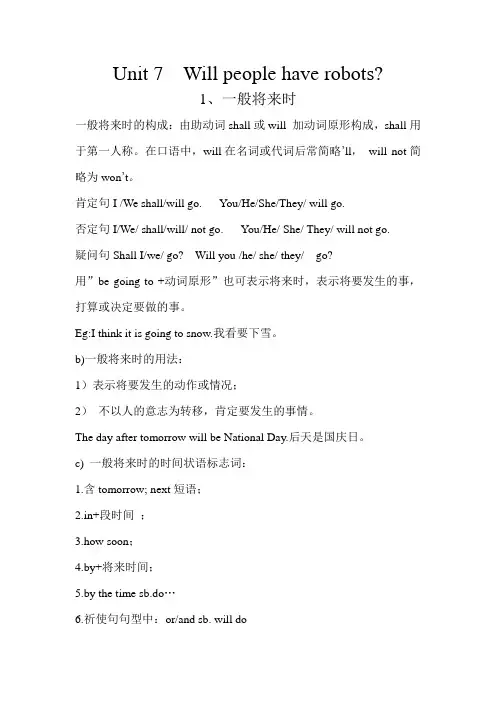
Unit 7 Will people have robots?1、一般将来时一般将来时的构成:由助动词shall或will 加动词原形构成,shall用于第一人称。
在口语中,will在名词或代词后常简略’ll,will not简略为won’t。
肯定句I /We shall/will go. You/He/She/They/ will go.否定句I/We/ shall/will/ not go. You/He/ She/ They/ will not go.疑问句Shall I/we/ go? Will you /he/ she/ they/ go?用”be going to +动词原形”也可表示将来时,表示将要发生的事,打算或决定要做的事。
Eg:I think it is going to snow.我看要下雪。
b)一般将来时的用法:1)表示将要发生的动作或情况;2)不以人的意志为转移,肯定要发生的事情。
The day after tomorrow will be National Day.后天是国庆日。
c) 一般将来时的时间状语标志词:1.含tomorrow; next短语;2.in+段时间;3.how soon;4.by+将来时间;5.by the time sb.do…6.祈使句句型中:or/and sb. will do7.在时间/条件状语从句中, 如果从句用一般现在时, 主句用将来时8.another dayin 与after的区别in是指以现在时间为起点的“在一段时间以后”。
也可以表示“在将来多少时间之内”,句子中的谓语动词要用一般将来时态;after常指以过去时间为起点的“一段时间之后”,所以它与过去时态连用。
当after指某个特定的未来时刻或日期之后,或指以将来某一时间为起点的若干时间之后时,它可以与将来时态连用。
例句:I'll be back in half an hour. 我半小时后就回来. 本句中的in 作"以后"解,不能用after代替。
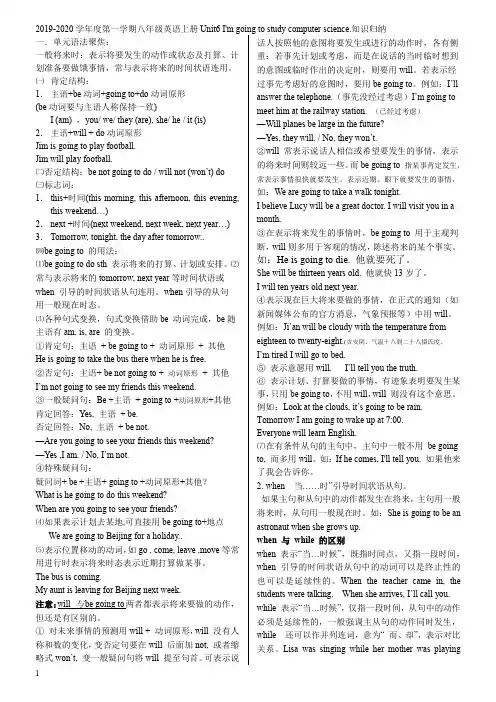
一.单元语法聚焦:一般将来时:表示将要发生的动作或状态及打算、计划准备要做饿事情,常与表示将来的时间状语连用。
㈠肯定结构:1.主语+be动词+going to+do动词原形(be动词要与主语人称保持一致)I (am) ,you/ we/ they (are), she/ he / it (is)2.主语+will + do动词原形Jim is going to play football.Jim will play football.㈡否定结构:be not going to do / will not (won’t) do㈢标志词:1.this+时间(this morning, this afternoon, this evening, this weekend…)2.next +时间(next weekend, next week, next year…) 3.Tomorrow, tonight, the day after tomorrow..㈣be going to 的用法:⑴be going to do sth 表示将来的打算、计划或安排。
⑵常与表示将来的tomorrow, next year等时间状语或when 引导的时间状语从句连用。
when引导的从句用一般现在时态。
⑶各种句式变换,句式变换借助be 动词完成,be随主语有am, is, are 的变换。
①肯定句:主语+ be going to + 动词原形+ 其他He is going to take the bus there when he is free.②否定句:主语+ be not going to + 动词原形+ 其他I’m not going to see my friends this weekend.③一般疑问句:Be +主语+ going to +动词原形+其他肯定回答:Yes, 主语+ be.否定回答:No, 主语+ be not.—Are you going to see your friends this weekend? —Yes ,I am. / No, I’m not.④特殊疑问句:疑问词+ be +主语+ going to +动词原形+其他?What is he going to do this weekend?When are you going to see your friends?⑷如果表示计划去某地,可直接用be going to+地点We are going to Beijing for a holiday..⑸表示位置移动的动词,如go , come, leave ,move等常用进行时表示将来时态表示近期打算做某事。
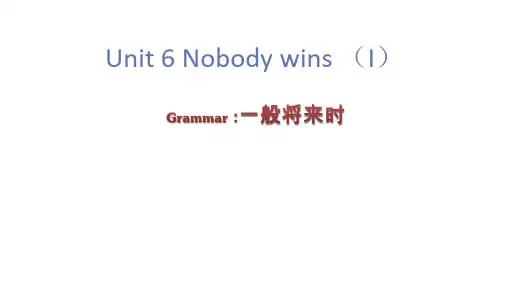
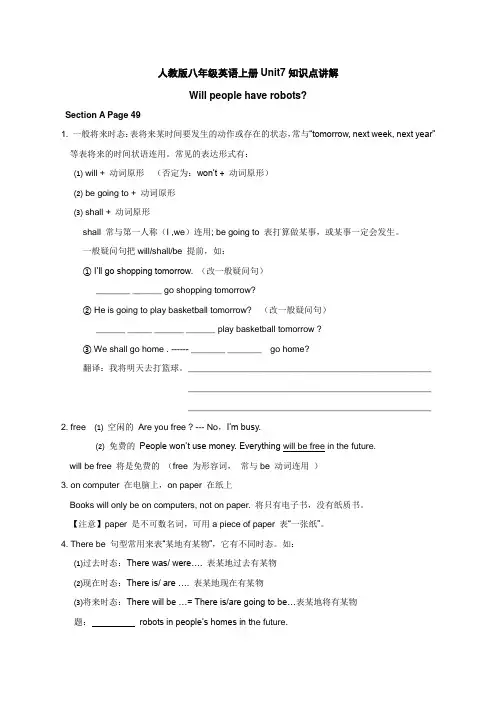
人教版八年级英语上册Unit7知识点讲解Will people have robots?Section A Page 491. 一般将来时态:表将来某时间要发生的动作或存在的状态,常与“tomorrow, next week, next year”等表将来的时间状语连用。
常见的表达形式有:⑴ will + 动词原形(否定为:won’t + 动词原形)⑵ be going to + 动词原形⑶ shall + 动词原形shall 常与第一人称(I ,we)连用; be going to 表打算做某事,或某事一定会发生。
一般疑问句把will/shall/be 提前,如:① I’ll go shopping tomorrow. (改一般疑问句)_______ ______ go shopping tomorrow?② He is going to play basketball tomorrow? (改一般疑问句)______ _____ ______ ______ play basketball tomorrow ?③ We shall go home . ------ _______ _______ go home?翻译:我将明天去打篮球。
______________________________________________________________________________________________________________________________________________________2. free ⑴空闲的Are you free ? --- No,I’m busy.⑵免费的People won’t use money. Everything will be free in the future.will be free 将是免费的(free 为形容词,常与be 动词连用)3. on computer 在电脑上,on paper 在纸上Books will only be on computers, not on paper. 将只有电子书,没有纸质书。
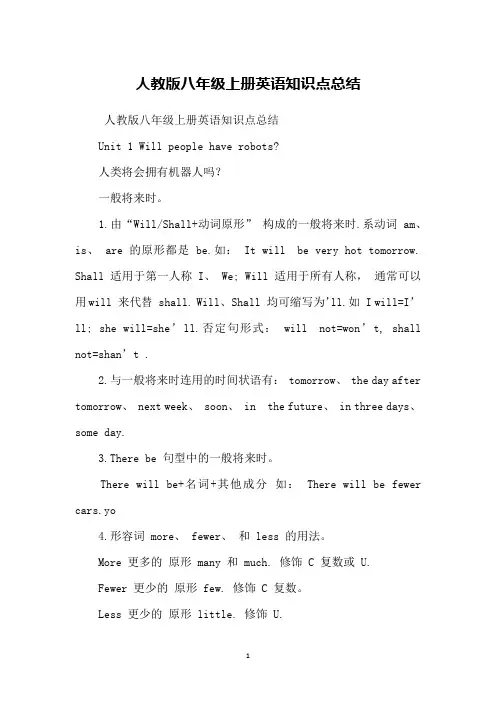
人教版八年级上册英语知识点总结人教版八年级上册英语知识点总结Unit 1 Will people have robots?人类将会拥有机器人吗?一般将来时。
1.由“Will/Shall+动词原形”构成的一般将来时.系动词 am、is、 are 的原形都是 be.如: It will be very hot tomorrow. Shall 适用于第一人称 I、 We; Will 适用于所有人称,通常可以用will 来代替 shall. Will、 Shall 均可缩写为’ll.如 I will=I’ll; she will=she’ll.否定句形式: will not=won’t, shall not=shan’t .2.与一般将来时连用的时间状语有: tomorrow、 the day after tomorrow、 next week、 soon、 in the future、 in three days、some day.3.There be 句型中的一般将来时。
There will be+名词+其他成分如: There will be fewer cars.yo4.形容词 more、 fewer、和 less 的用法。
More 更多的原形 many 和 much. 修饰 C 复数或 U.Fewer 更少的原形 few. 修饰 C 复数。
Less 更少的原形 little. 修饰 U.Unit2 What should I do?我应该做什么?1.情态动词 should.Should 和 can、 may、 must 等情态动词一样,无人称和数的变化,后接动词原形,能独立构成疑问句和否定句。
如: Who should pay the taxes? You shouldn’t play football in the street.2.情态动词 could.单独的情态动词,表“能,可以”。
用来提供建议,后跟动词原形.它和 should 都用来提供建议。
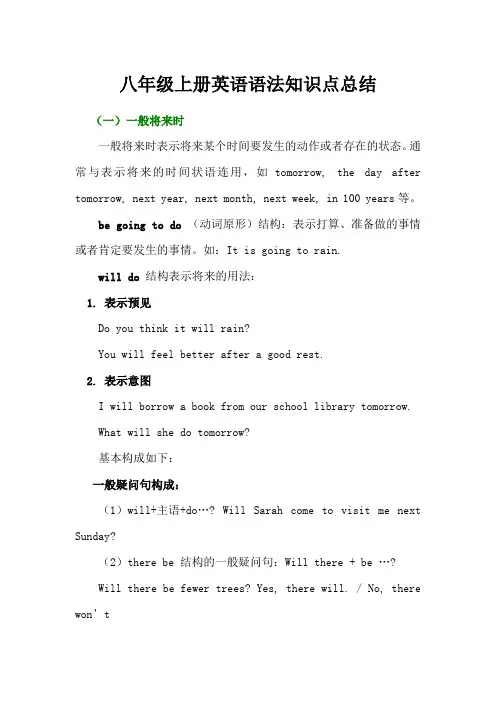
八年级上册英语语法知识点总结(一)一般将来时一般将来时表示将来某个时间要发生的动作或者存在的状态。
通常与表示将来的时间状语连用,如tomorrow, the day after tomorrow, next year, next month, next week, in 100 years等。
be going to do(动词原形)结构:表示打算、准备做的事情或者肯定要发生的事情。
如:It is going to rain.will do结构表示将来的用法:1. 表示预见Do you think it will rain?You will feel better after a good rest.2. 表示意图I will borrow a book from our school library tomorrow. What will she do tomorrow?基本构成如下:一般疑问句构成:(1)will+主语+do…? Will Sarah come to visit me next Sunday?(2)there be 结构的一般疑问句:Will there + be …?Will there be fewer trees? Yes, there will. / No, there won’t否定句构成:will + not (won’t)+doSarah won’t come to visit me next Sunday.特殊疑问句构成:特殊疑问词+will+主语+…?What will Sarah do next Sunday?练一练根据例句,用will改写下列各句例:I don’t feel well today. (be better tomorrow)I’ll be better tomorrow.1. Gina has six classes today. (have a lot of homework tonight)_____________________________2. I’m tired now. (sleep later)_____________________________3. My parents need a new car. (buy one soon)_____________________________4. We can’t leave right now. (leave a little later)_____________________________5. The weather is awful today. (be better tomorrow)_____________________________答案:1. She’ll have a lot of homework tonight.2. I’ll sleep later.3. They’ll buy one soon.4. We’ll leave a little later.5. Maybe it’ll be better tomorrow.(二)should的用法:should用来提出建议和忠告,后边加动词原形,否定句直接在should后边加not.例如:I think you should eat less junk food.我认为你应该少吃垃圾食品。
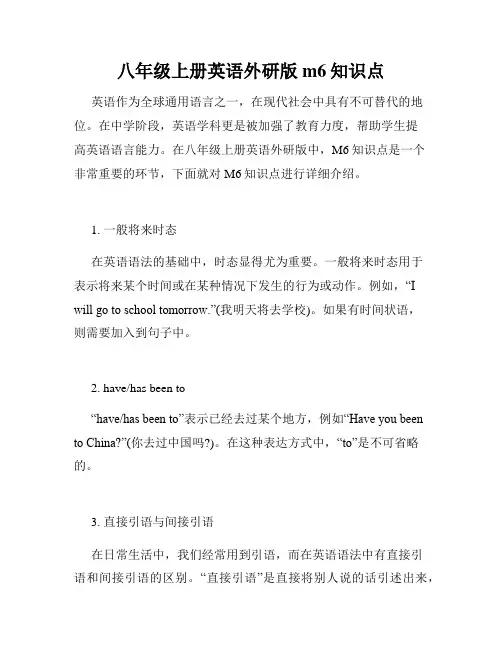
八年级上册英语外研版m6知识点英语作为全球通用语言之一,在现代社会中具有不可替代的地位。
在中学阶段,英语学科更是被加强了教育力度,帮助学生提高英语语言能力。
在八年级上册英语外研版中,M6知识点是一个非常重要的环节,下面就对M6知识点进行详细介绍。
1. 一般将来时态在英语语法的基础中,时态显得尤为重要。
一般将来时态用于表示将来某个时间或在某种情况下发生的行为或动作。
例如,“I will go to school tomorrow.”(我明天将去学校)。
如果有时间状语,则需要加入到句子中。
2. have/has been to“have/has been to”表示已经去过某个地方,例如“Have you been to China?”(你去过中国吗?)。
在这种表达方式中,“to”是不可省略的。
3. 直接引语与间接引语在日常生活中,我们经常用到引语,而在英语语法中有直接引语和间接引语的区别。
“直接引语”是直接将别人说的话引述出来,并用引号把他们的原话包含在内。
“间接引语”则是把别人说的话转化成自己的话,不再用引号表示。
例如,-Direct speech: “I love English,” she said.-Indirect speech: She said that she loved English.4. must, should和ought to的用法must用于表示强制、义务、必须和应该,例如“I must finish my homework before I go to bed.”(我必须在睡觉前完成我的作业)。
should和ought to是表示应该、应当,但没有强制性。
例如“Students should/ought to finish their homework on time.”(学生应该按时完成作业)。
5. 情态动词的疑问句和否定句情态动词主要有can、must、should、may、might、will和shall 等。
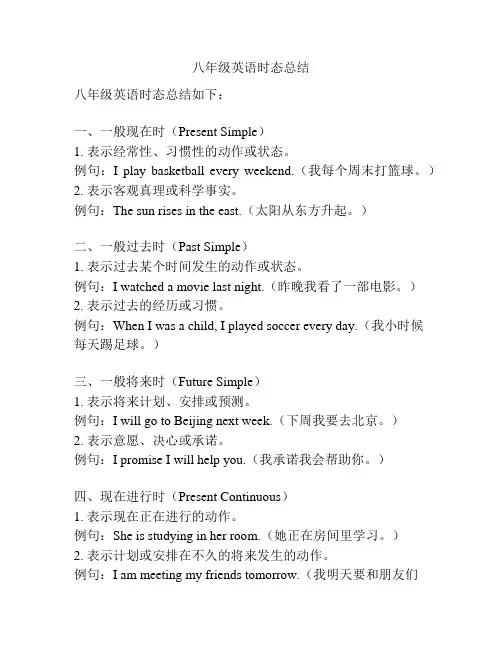
八年级英语时态总结八年级英语时态总结如下:一、一般现在时(Present Simple)1. 表示经常性、习惯性的动作或状态。
例句:I play basketball every weekend.(我每个周末打篮球。
)2. 表示客观真理或科学事实。
例句:The sun rises in the east.(太阳从东方升起。
)二、一般过去时(Past Simple)1. 表示过去某个时间发生的动作或状态。
例句:I watched a movie last night.(昨晚我看了一部电影。
)2. 表示过去的经历或习惯。
例句:When I was a child, I played soccer every day.(我小时候每天踢足球。
)三、一般将来时(Future Simple)1. 表示将来计划、安排或预测。
例句:I will go to Beijing next week.(下周我要去北京。
)2. 表示意愿、决心或承诺。
例句:I promise I will help you.(我承诺我会帮助你。
)四、现在进行时(Present Continuous)1. 表示现在正在进行的动作。
例句:She is studying in her room.(她正在房间里学习。
)2. 表示计划或安排在不久的将来发生的动作。
例句:I am meeting my friends tomorrow.(我明天要和朋友们见面。
)五、过去进行时(Past Continuous)1. 表示过去某一时刻正在进行的动作。
例句:He was reading a book when I entered the room.(我进屋的时候他正在读书。
)2. 表示过去同时发生的两个动作。
例句:I was cooking while he was watching TV.(他在看电视的时候我在做饭。
)六、将来进行时(Future Continuous)表示将来某个时间正在进行的动作。
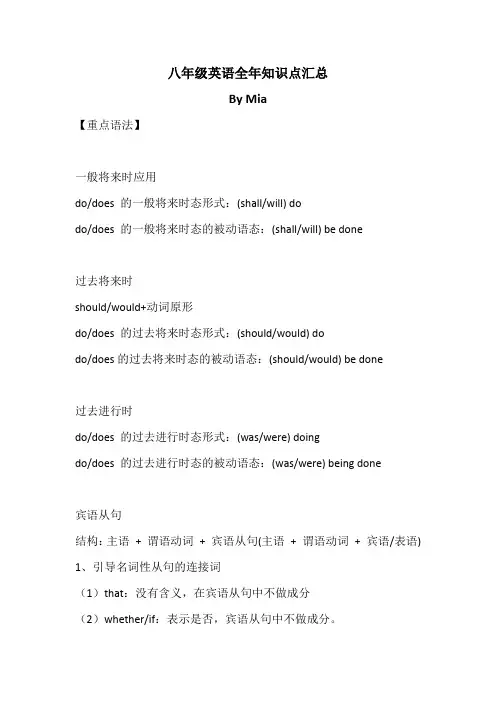
八年级英语全年知识点汇总By Mia【重点语法】一般将来时应用do/does 的一般将来时态形式:(shall/will) dodo/does 的一般将来时态的被动语态:(shall/will) be done过去将来时should/would+动词原形do/does 的过去将来时态形式:(should/would) dodo/does的过去将来时态的被动语态:(should/would) be done过去进行时do/does 的过去进行时态形式:(was/were) doingdo/does 的过去进行时态的被动语态:(was/were) being done宾语从句结构:主语+ 谓语动词+ 宾语从句(主语+ 谓语动词+ 宾语/表语) 1、引导名词性从句的连接词(1)that:没有含义,在宾语从句中不做成分(2)whether/if:表示是否,宾语从句中不做成分。
(3)连接代词:what, which, who, whom, whose(在宾语从句中做主、宾、表和定语)连接副词:where, when, how, why(在宾语从句中做状语)2、在做宾语从句的题目时应注意时态(1)当主句是现在时态时,宾语从句可以根据需要使用任何时态。
(2)当主句是过去时态时,宾语从句必须是一种过去的时态。
(3)当表示客观事实或普遍真理的句子做宾语从句时,任何时候都用一般现在时。
if 引导的条件状语从句结构:主句+ if + 条件状语从句if + 条件状语从句+ [(comma)] + 主句注意:在if 引导的条件状语从句中,主句应用将来时态,状语从句用一般现在时态。
现在完成进行时态do/does 的现在完成进行时态形式:have/has been doingdo/does 的现在完成进行时态的被动语态:have/has been being done 现在完成进行时态所应用的场合:①某事从过去发生一直持续到现在都在做②过去发生的动作对现在造成影响【重点考点】1. most of…意为“……中的大多数”,后跟名词/代词(宾格)。
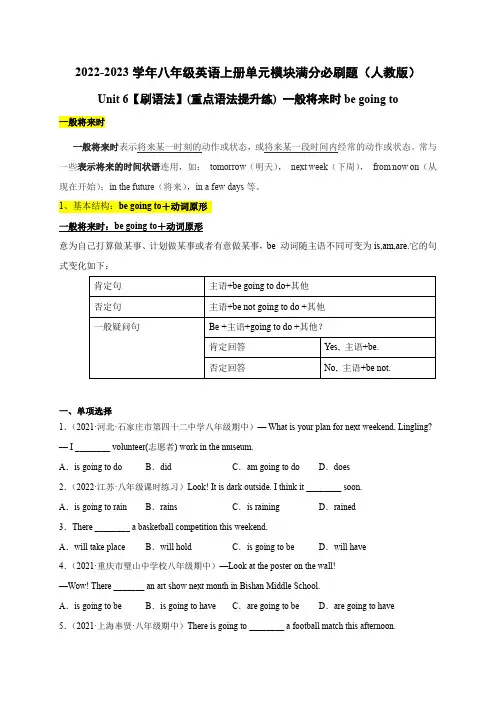
2022-2023学年八年级英语上册单元模块满分必刷题(人教版)Unit 6【刷语法】(重点语法提升练) 一般将来时be going to一般将来时一般将来时表示将来某一时刻的动作或状态,或将来某一段时间内经常的动作或状态。
常与一些表示将来的时间状语连用,如:tomorrow(明天),next week(下周),from now on(从现在开始);in the future(将来),in a few days等。
1、基本结构:be going to+动词原形一般将来时:be going to+动词原形意为自己打算做某事、计划做某事或者有意做某事,be 动词随主语不同可变为is,am,are.它的句式变化如下:一、单项选择1.(2021·河北·石家庄市第四十二中学八年级期中)— What is your plan for next weekend, Lingling?— I ________ volunteer(志愿者) work in the museum.A.is going to do B.did C.am going to do D.does2.(2022·江苏·八年级课时练习)Look! It is dark outside. I think it ________ soon.A.is going to rain B.rains C.is raining D.rained3.There ________ a basketball competition this weekend.A.will take place B.will hold C.is going to be D.will have4.(2021·重庆市璧山中学校八年级期中)—Look at the poster on the wall!—Wow! There _______ an art show next month in Bishan Middle School.A.is going to be B.is going to have C.are going to be D.are going to have 5.(2021·上海奉贤·八年级期中)There is going to ________ a football match this afternoon.A.have B.has C.is D.be6.(2021·山东济南·八年级期中)—What do you plan to do this weekend?—We ________ soccer. We play it once a week.A.play B.playedC.are going to play D.are playing7.(2021·广东·湛江一中培才学校八年级期中)There ________ a concert at 7:00 this evening.A.is going to have B.is going to be C.is having D.will have8.(2021·河北·石家庄市第二十八中学八年级期中)There ________ two new movies in Sunshine Movie Theater tonight.A.is going to have B.will have C.is going to be D.are going to be 9.(2021·河北·石家庄市第二十八中学八年级期中)—Shall we go to the museum tomorrow?—I’d love to, but I’m afraid I can’t. I ________ my grandparents.A.visit B.visited C.am going to visit D.is visiting 10.(2021·河北·石家庄市第二十五中学八年级期中)— Mom, I ________ my clothes when I come back home.— OK. You promise me.A.am washing B.am going to wash C.washed D.wash11.(2021·黑龙江·哈尔滨市第十七中学校八年级期中)—Are there any robots in your home now?—No, but there ________ a lot of robots in people’s homes ________.A.will be, 100 years ago B.are going to have, in 100 years C.are going to be, in 100 years 12.(2019·福建省福州第十九中学八年级期中)Look at those big black clouds. It ________ rain. Let’s hurry.A.must B.will C.would D.is going to 13.(2021·广东·东莞市新世纪英才学校八年级期中)________ your cousin ________ me next week? A.Is; going to visit B.Does; going to visit C.Is; goes to visit D.Does; goes to visit 14.(2018·广东·珠海市斗门区实验中学八年级期中)—My sister and I _________ the park this Sunday. Do you want to go with us?A.visit B.visits C.visited D.are going to visit 15.(2020·辽宁·灯塔市教师进修学校八年级期中)There is going to ________ a meeting the day aftertomorrow(后天).A.have B.be C.has D./二、完成句子16.——本周末打算去哪儿野餐,杰克?——玉湖公园。
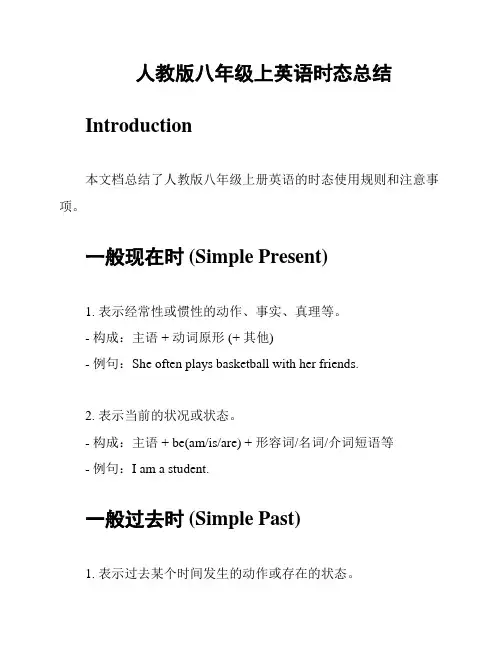
人教版八年级上英语时态总结Introduction本文档总结了人教版八年级上册英语的时态使用规则和注意事项。
一般现在时 (Simple Present)1. 表示经常性或惯性的动作、事实、真理等。
- 构成:主语 + 动词原形 (+ 其他)- 例句:She often plays basketball with her friends.2. 表示当前的状况或状态。
- 构成:主语 + be(am/is/are) + 形容词/名词/介词短语等- 例句:I am a student.一般过去时 (Simple Past)1. 表示过去某个时间发生的动作或存在的状态。
- 构成:主语 + 动词过去式 (+ 其他)- 例句:He studied English last night.一般将来时 (Simple Future)1. 表示将来某个时间或将来经常性发生的动作。
- 构成:主语 + will + 动词原形 (+ 其他)- 例句:They will visit their grandparents next week. 现在进行时 (Present Continuous)1. 表示当前正在进行的动作。
- 构成:主语 + be(am/is/are) + 现在分词(+ 其他) - 例句:She is watching TV right now.过去进行时 (Past Continuous)1. 表示过去某个时间正在进行的动作。
- 构成:主语 + was/were + 现在分词(+ 其他)- 例句:They were playing soccer at that time.高级时态1. 现在完成时 (Present Perfect)- 表示过去的某个时间到现在的动作或状态。
- 构成:主语 + have/has + 过去分词(+ 其他)- 例句:I have finished my homework.2. 过去完成时 (Past Perfect)- 表示过去的某个时间之前的动作或状态。
初二中常见的动词时态总结动词时态在英语语法中起到非常重要的作用,它用于描述动作发生的时间和状态的变化。
在初二阶段学习英语时,我们常常会学习到一些常见的动词时态,下面是对这些时态的总结。
一、一般现在时(Simple Present Tense)一般现在时用于描述经常性或习惯性的动作,以及客观事实。
例句:1. I go to school every day.2. She likes to play basketball.3. They live in London.二、一般过去时(Simple Past Tense)一般过去时用于描述已经发生的过去的动作或状态。
例句:1. I played football yesterday.2. He watched a movie last night.3. They visited their grandparents last summer.三、一般将来时(Simple Future Tense)一般将来时用于描述将来要发生的动作或打算要做的事情。
1. We will go shopping tomorrow.2. She is going to travel to Japan next month.3. They are going to have a party on Saturday.四、现在进行时(Present Continuous Tense)现在进行时用于描述正在进行的动作或临时的状态。
例句:1. They are playing football in the park now.2. She is studying for the exam at the moment.3. I am not watching TV right now.五、过去进行时(Past Continuous Tense)过去进行时用于描述过去某个时间正在进行的动作。
2022-2023学年八年级英语上册单元模块满分必刷题(人教版)Unit 7【刷语法】(重点语法提升练) 一般将来时will一般将来时一般将来时表示将来某一时刻的动作或状态,或将来某一段时间内经常的动作或状态。
常与一些表示将来的时间状语连用,如:tomorrow(明天),next week(下周),from now on(从现在开始);in the future(将来),in a few days等。
一般将来时:will+动词原形用于描述未来的事情或表达对将来的预测等,will没有人称和数的变化,它的句式变化为:will 和be going to 的区别will 和be going to一般可以互用,但有时有区别:1)含时间和条件状语从句,如果主句是将来时,多用will.2)如果不是以人的意愿为转移,将来肯定会发生的动作和状态,多用will3)be going to根据迹象推测,有可能发生的事情或计划要做的事情。
一、单项选择1.(2022·江苏·南京师范大学附属中学江宁分校八年级阶段练习)—Which team do you think ________ the match?—Hard to say. There are still 15 minutes before it ends.A.won B.winning C.will win D.wins2.(2021·福建·厦门外国语学校八年级期中)—There ________ a wonderful table tennis game in the gym tomorrow.—How wonderful! Let’s go together.A.is going to have B.will be C.will have3.(2021·江苏扬州·八年级期中)—Dad, don’t smoke (抽烟) any more. It’s bad for your health.—OK, I ________.A.won’t B.do C.don’t D.will4.(2021·江苏·淮安市淮安区教师发展中心学科研训处八年级期中)I hope Lily ________ to my birthday party next week.A.to come B.come C.will come D.comes5.(2022·湖北武汉·八年级期末)—The students are excited about ________ for the coming trip.—It’s natural for them to talk with excitement.A.what will they do B.where they went C.how will they go there D.who will go with them 6.(2021·北京市陈经纶中学八年级期中)Tom and Mary ________ to China next month.A.come B.came C.coming D.will come7.(2022·江苏·八年级课时练习)—Max, ________afraid of speaking in front of people. You’re the best.—OK, I ________.A.don’t be; will B.don’t be; won’t C.not be; will D.not be; won’t8.It ________ winter soon, so we will buy some warm clothes.A.is B.are C.will be D.can be9.I don’t know if I ________ free tomorrow. If I ________ free, I will go to the bookstore.A.am; am B.will be; will be C.will be; am D.am; will be10.Nobody knows if the editor ________ tomorrow because the temperature will drop ________ -10℃. A.comes; to B.will come; by C.will come; to D.comes; by11.—Will Amy go skiing with us this Saturday?—Sorry, I don’t know if she ________.A.will go B.goes C.went D.was going12.I hope you ________ yourself at the party this Sunday.A.are enjoy B.will enjoyC.to enjoy D.enjoying13.—What ________ you ________ tomorrow afternoon?—________ a football match. I want to watch it.A.are; going to do; There will haveB.will; do; There will going to beC.will; do; There is going to beD.will; do; There have14.—Will people build more buildings in their hometown?—No, they __________.A.can’t B.don’t C.won’t D.aren’t15.—Linda, what are you doing?—I’m practicing the violin. There ________ an art festival in our school next week.A.will be B.will have C.was D.has16.—Will you go to the movies with Katie tonight?—________. I have to do my homework tonight.A.Yes. I will B.No, I won’t C.Yes, I do D.No. I don’t17.There are so many problems, but I’m sure he ________ all of them in two days.A.solves B.is solving C.solved D.will solve18.—Did you clean your room this morning?—No. But I ________ it at once.A.cleaned B.am cleaning C.will clean D.clean19.—What’s your prediction about the future?—I think there ________ more people and ________ trees.A.will have; fewer B.will have; less C.will be; fewer D.will be; less20.—Billy, what will you do to help with housework this winter vacation?—I think I ________ the dishes.A.do B.did C.am doing D.will do21.Stop smoking, Joe! You ________ yourself if you keep on doing it like that.A.killed B.kill C.will kill D.are killing 22.(2021·黑龙江哈尔滨·八年级单元测试)I’m not sure if you ______ free tomorrow. If you are free, let’s ______ the different kinds of resolutions.A.are, discuss about B.will be, discuss aboutC.will be, discuss23.—Will you join us?—________.A.No, I will B.Of course, I will C.I hope not D.Yes, I do 24.(2022·全国·八年级期末)—Do you know when he ________ the work?—Sorry, I don’t know. But I think when the work ________, he will let me know.A.will finish; will be finish B.finishes; finishesC.finishes; will finish D.will finish; is finished25.Don’t worry. We ________ up with others soon.A.is catching B.caught C.will catch D.catches二、完成句子26.(2022·江苏·南京市第十二初级中学八年级期中)比赛将在南京奥体中心举行。
四种时态总结注意事项【注意】不宜用进行时态的动词:表示心理状态、情感的动词,如:love, like, hate, care, know, understand, forget, remember, believe, want, agree, wish, mean 等;表示存在的动词,如:be, lie(位于) 等;表示一瞬间发生的动作,如:get, buy, end, receive 等。
例:I like English very much. 和Guizhou lies in the south of China.一般将来时与一般现在时区别(一)现在进行时表示动作的暂时性,而一般现在时表示动作的习惯性和经常性I am watching TV now. (暂时性)I watch TV every day. (经常性)(二)现在进行时可表示短暂性动作,而一般现在时表示长久性动作。
Lucy is living in Beijing.(短时间居住)Lucy lives in Beijing. (长久性居住)(三)现在进行时表示的动作可带有感情色彩,而一般现在时所表述的动作通常是事实。
You’re always forgetting the most important t hings. (责备)He is always helping others. (赞扬)He often helps others. (事实)(四)有些动词不能用进行时,know,understand,love,like,hate,wish,want,think,hope,have,believe,agree,hear,see,notice,等等。
这些动词通常用一般现在时表示说话时发生的动作。
I have a lot of friends here.注意:He is falling and downstairs。
(他正在从楼上摔下来)如果有人说摔下来是一瞬间的事不能用现在进行时是不对的,因为我们描述的是他正在摔下来,而不是要已经摔下来了。
人教版英语八年级上册Unit6-7语法重点:一般将来时专项讲解与练习一般将来时表示将来某一时段的动作或状态,或将来某一段时间内经常的动作或状态。
在英语时态中,"时"指动作发生的时间,"态"指动作的状态(形式)。
一般将来时常和表示将来的时间状语连用。
如:tomorrow(明天);next week(下周);in the future(将来);in a year(一年以后)等。
一般将来时通常由助动词will + 动词原形或用be going to + 动词原形构成。
例句:He will get married. 他就快结婚了。
She will have a daughter.她就会有个女儿了。
We are going to buy some books and pencils tomorrow. 明天我们要买一些书和铅笔。
1、由助动词will + 动词原形构成例句:He will graduate from Harvard University next year.他明年哈佛大学毕业。
Spring will come again.春天会再回来。
2、由be going to+动词原形构成。
这种结构表示“决定、打算要做什么事,或有迹象表明即将发生、可能会出现什么情况,有趋势,注定会,不限于指人的活动”。
例句:I am going to buy a new coat this winter.今年我打算买一件新大衣。
There is going to be a thunder-storm.将有一场雷暴雨。
The journey is going to be difficult.这次旅行将极为艰难。
【be going to和will的比较:】①will表示说话人认为、相信、希望或假定要发生的事,不含任何具体时间,可以指遥远的将来。
而be going to指有迹象表明某事即将发生或肯定会发生,通常表示很快就要发生的事情。